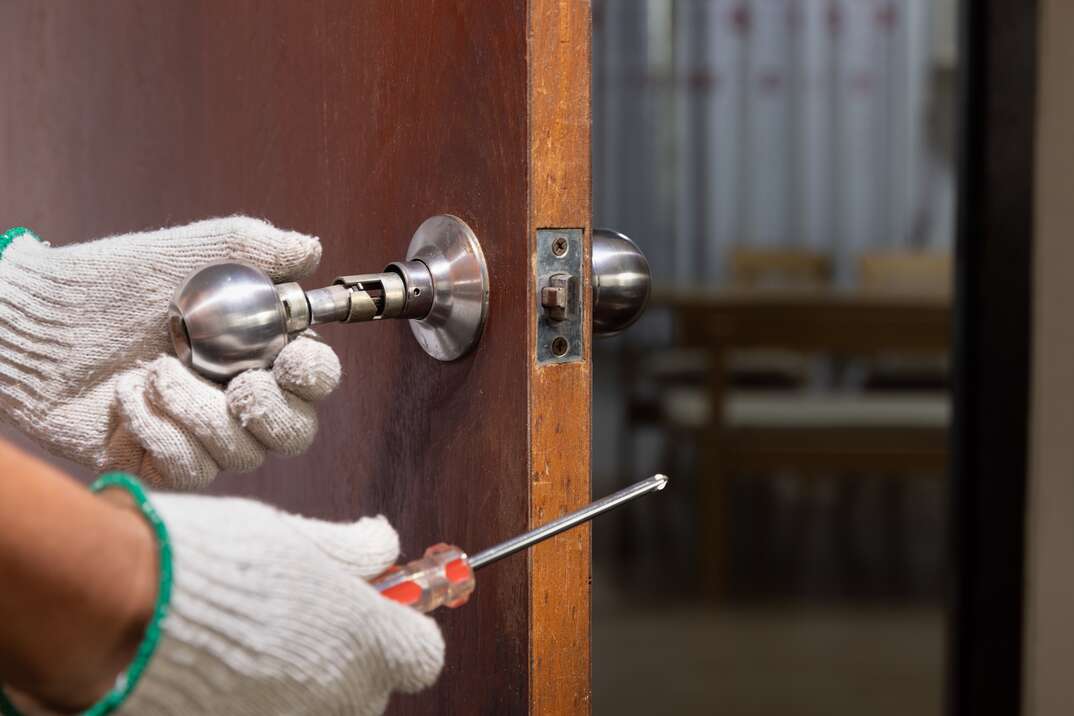- AppliancesElectriciansHVACLandscapingLocksmithPest ControlPlumbingRenovationRoofingT V RepairAll Home Improvement
- Car AccidentClass ActionCorporate LawCriminal DefenseDivorce LawEmployment LawFamily LawFinancial LawLegal AidMedical Injury LawyersMedical MalpracticeReal Estate LawWater Fire RestorationAll Legal
- InvestmentRetirementAll Finance
- Animal InsuranceAutoGeneral InsuranceHealth PolicyHome RentersAll Insurance
- DentalHealth SpecialistsAll Medical
- Animal CareVeterinaryAll Pets
- Auto GlassTowingAll Automotive
Do You Have a Broken Lock? 6 Signs It's Time for a New One

What do you do when the keys to your kingdom don't work? A malfunctioning or broken lock is more than an annoyance. It affects the security of your home.
Read More Locksmith and Security Articles
Learn the signs of a broken — or soon-to-be broken — lock to know when it's time for a lock repair or replacement.
Your door could be giving you subtle hints that it needs help. Sometimes you can fix door lock issues, but other times, it's best to replace it to make sure your home is secure. The following signs could mean you have a failing or broken lock mechanism.
1. Loose Doorknob
A loose, wobbly door knob isn't a secure one. When you use the knob, it should feel tight and turn smoothly without any jiggling. A wiggly handle could mean the knob itself just needs to be tightened, but it could also indicate you have weak or damaged internal components, which compromises the security of the lock.
Before you replace the lock, try tightening the knob itself. Look for an exposed screw you can tighten. Some newer models use hidden screws. You'll need to first release the knob and then remove the faceplate to reveal the screws. If tightening the door knob screws doesn't help, it's time to replace the lock.
2. Tightness
You want your doorknob and lock to be a little tight, but you still need to be able to turn them. If the lock becomes so tight that it's difficult or impossible to turn, you likely have an issue with the internal lock cylinder. When the lock cylinder becomes loose or damaged, it keeps the lock from turning as it should. Tight doorknobs can also happen if the mechanism lacks oil to allow the moving parts to turn smoothly or if there's rust inside that's binding the parts.
Lubricating the lock could help restore the smooth operation of the knob. If you suspect rust, use a rust-removing lubricant product on the door. If the issue is the lock cylinder, you'll need to replace the lock to ensure it works properly. A locksmith can determine the specific cause of the tightness and offer proper solutions.
3. Difficulty Locking or Unlocking
Another major sign of a broken lock is difficulty locking or unlocking the door. You might be able to get the lock to work eventually, but it could take a lot of time and effort to get it to work.
Sometimes, this happens if the lock has rust or gunk inside the components. Try spraying rust-removing lubricant into the lock first. This could break up the debris and allow the lock to turn freely again.
You might also notice difficulty locking and unlocking your door as the lock wears out. The components still work for now, but they're getting worn and could fail completely at any time. Replacing the lock before it fully wears out can prevent you from getting locked out of your home or dealing with a broken key.
More Related Articles:
- 8 Benefits of Installing Smart Locks
- Here’s How Much a Locksmith Charges for 5 of the Most Common Services
- Lose Your Keys Often? Here's How to Prevent Lockouts
- Installing a New Deadbolt? Here's Everything You Need to Know
- What Is Rekeying a Lock?
4. Spinning Key
In this scenario, you can turn the key in the lock, but it just keeps turning without locking or unlocking the knob. Under normal conditions, the key only turns to a certain point when locking or unlocking the door. If it continues spinning, the lock likely has an issue in the lock cylinder. To keep your home secure, replace the lock if this happens.
5. Key Jams
Sometimes you can't get the key fully inside the lock, or it won't turn when you insert it. This can happen if the cylinder spring inside the locking mechanism fails. If you force the key, it could break off in the lock or get stuck. This creates a security issue if you don't resolve it immediately. Calling a locksmith to remedy the situation is the best solution. The lock generally needs to be rekeyed or replaced due to the damaged internal parts.
6. Strange Noises
Damage inside the doorknob or locking mechanism could create new noises when you try to use the door. A common issue is a grinding noise, which could mean you have a broken lock cylinder. Replacing the lock fixes this issue. If it's a new lock, grinding could indicate the lock wasn't installed correctly. A locksmith can listen to the noises your lock is making and determine the cause.
Elocal Editorial Content is for educational and entertainment purposes only. Editorial Content should not be used as a substitute for advice from a licensed professional in your state reviewing your issue. Systems, equipment, issues and circumstances vary. Follow the manufacturer's safety precautions. The opinions, beliefs and viewpoints expressed by the eLocal Editorial Team and other third-party content providers do not necessarily reflect the opinions, beliefs and viewpoints of eLocal or its affiliate companies. Use of the Blog is subject to the
Website Terms and Conditions.The eLocal Editorial Team operates independently of eLocal USA's marketing and sales decisions.

